All About Stream Scanners
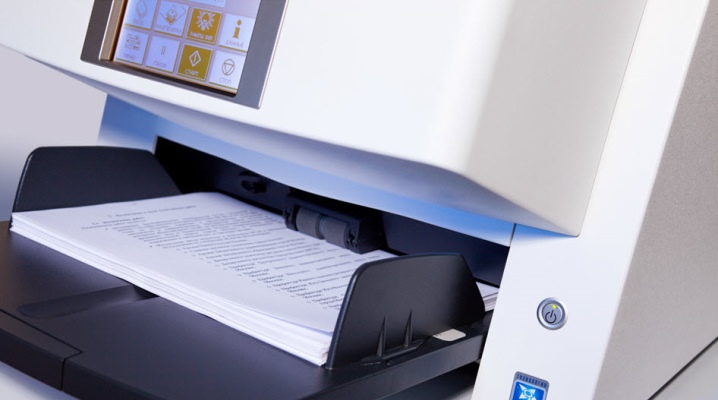
Consumer electronics are very diverse. Let's talk about such essential techniques as flow scanners. Let's review two-sided and other models for scanning documents.
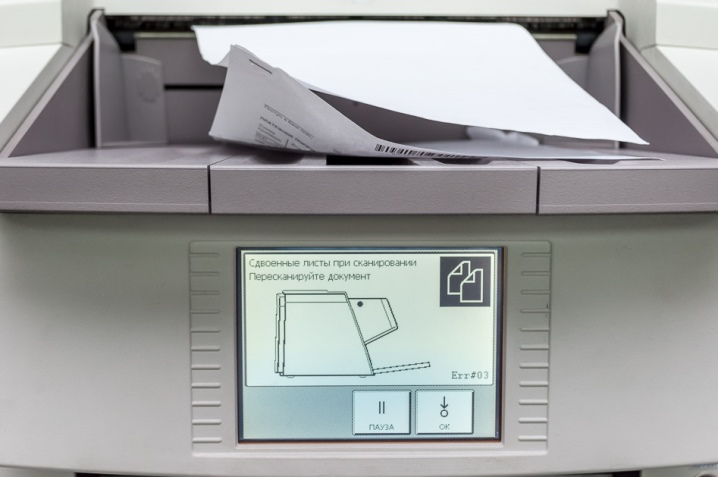
Peculiarities
A conversation about an in-line scanner should start with defining what it is. The exact synonym is the broaching scanner. In such devices, all sheets go in the gap between special rollers. Working "on-stream" means digitizing a significant number of documents in a limited time. Therefore, productivity is high, and the level of wear, on the contrary, is very low. It will not work to buy a stream type scanner for little money, even on the secondary market. This is the equipment that should be used for serious work. Similar devices are used in:
offices of large organizations;
archives;
libraries;
educational institutions;
large companies;
government agencies.
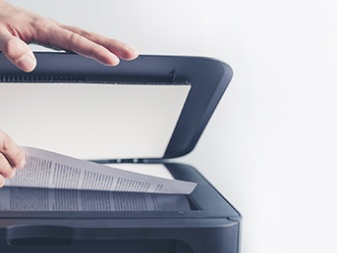
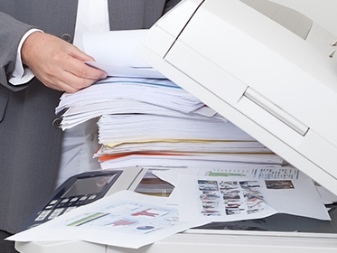
It is extremely rare for in-line scanning of documents to be used at home. And it is unlikely that there will be tasks that are suitable in terms of complexity and volume. The choice of in-line and even multi-threaded scanners for the commercial sector is very large. Therefore, it is necessary to carefully deal with each specific model. Most versions implement network method of connecting to computers.
Therefore, most often they use sending jobs and scanned materials over the local network of an enterprise (organization). For this purpose, the copier is connected in isolation and a special network address is allocated for it.
Most models are equipped with automatic document feeder systems. This reduces the amount of manual manipulation to the limit and allows you to increase the scan rate up to 200 images per minute.
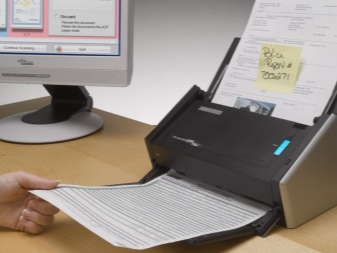
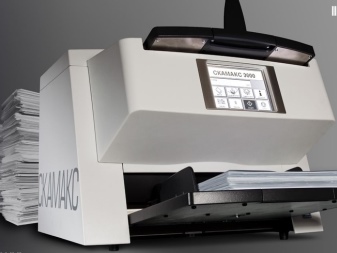
Varieties
The most important characteristic of any scanner is precisely the amount of materials that can be stably processed by it... A3 format is focused on office and administrative areas. It allows you to successfully copy even fairly large documents and printed, handwritten, drawn materials. A3 devices are also useful for working with business cards, maps, diagrams, plans and drawings.
This technique may differ:
well-thought-out paper feeding system;
double-sided scanning mode;
ultrasonic sensors (which detect the bound pages).
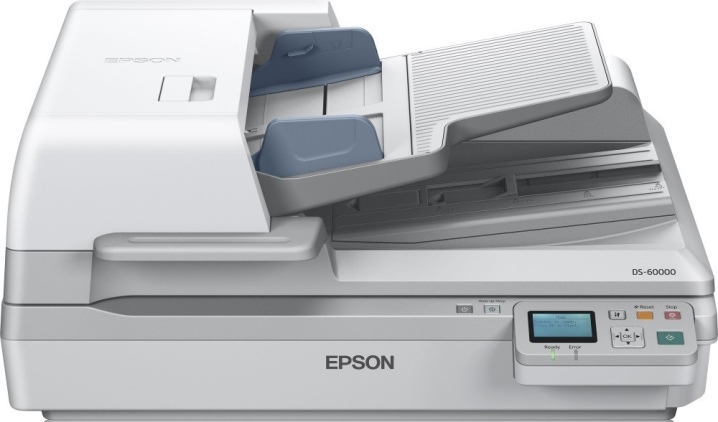
For A4 size
This is the most common format for text documents. This is what most office materials are like. Therefore, A4 scanners are more common than equipment with large sizes. There is only one minus - they will not be able to remove an image from a sheet larger than 210x297 mm.
However, in practice, this limitation is circumvented by using scanners of different formats.
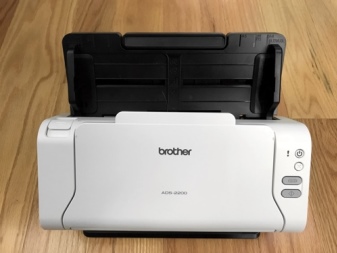
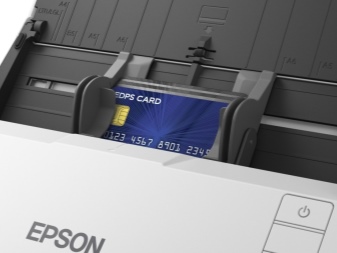
Model overview
Streaming technology from Epson certainly deserves attention. It is suitable even for very large volumes of work. Including for companies that completely transfer their workflow to an electronic basis and need to fully copy the texts accumulated over many years. Epson's technique works well both with ordinary reports and with various forms, questionnaires, business cards. Implemented all the necessary functionality for remote scanning of documents by employees of working groups within a few minutes.
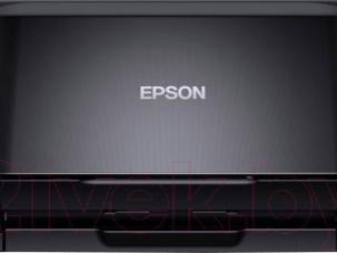
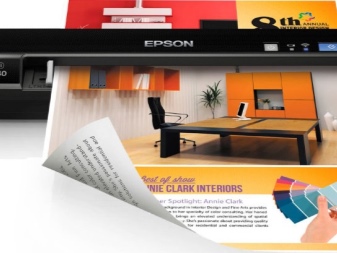
First of all, you should pay attention to the light, mobile WorkForce DS-70.
One pass (page processing) takes 5.5 seconds. The scanner can digitize up to 300 pages per day. He works with documents with a density of 35 to 270 g per 1 sq. m. The images are digitized using a CIS sensor.The device is powered by an LED lamp. It will not be able to digitize opaque originals or film. Under normal conditions, the working resolution is 600x600 pixels. Other important parameters:
color with a depth of 24 or 48 bits;
scanned area 216x1828 points;
processing of sheets no more than A4;
OS X compatibility;
own weight 0.27 kg;
linear dimensions 0.272x0.047x0.034 m.
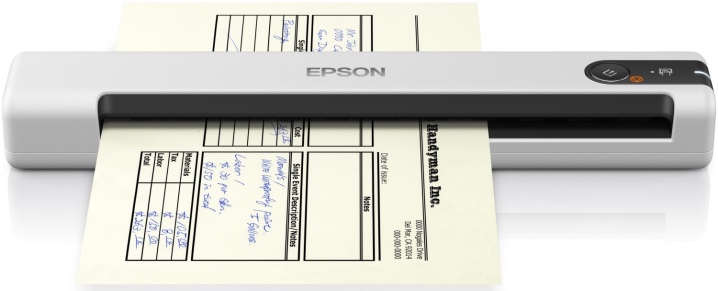
DS-780N Is another good model of a stream scanner from Epson. The device is suitable for large workgroups. When creating it, we tried to provide a full-fledged two-sided scanning. The speed of work is 45 pages per minute or 90 individual images in the same time. The device is equipped with a 6.9 cm LCD touch screen.
The following parameters are also declared:
the ability to scan long (up to 6,096 m) documents;
processing sheets of paper with a density of 27 to 413 g per 1 sq. m .;
USB 3.0 protocol;
daily load up to 5000 pages;
ADF 100 sheets;
CIS sensor;
resolution 600x600 pixels;
Wi-Fi connection and ADF are not provided;
weight 3.6 kg;
hourly current consumption 0.017 kW.
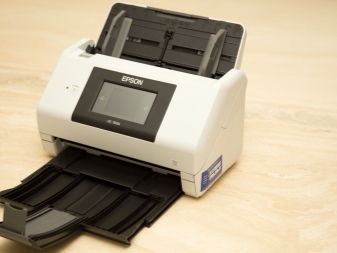
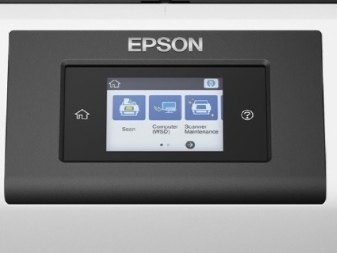
A pleasant alternative might be Scanner "Scamax 2000" or "Scamax 3000"... The 2000 series only works in black and white and grayscale. The 3000 series also has a multi-color mode. The speed of text-to-digital translation varies from 90 to 340 pages per minute. It does not change in any mode, one-sided or two-sided scanning.
The manufacturer promises to confidently copy even crumpled and deformed originals. At the hardware level, the "subtraction" of the background color is provided. If the image is slightly skewed, the scanner will revert it as needed. Noise and black border removal is provided.
To speed up the work, the skip of blank pages is provided.
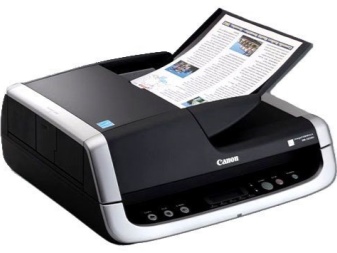
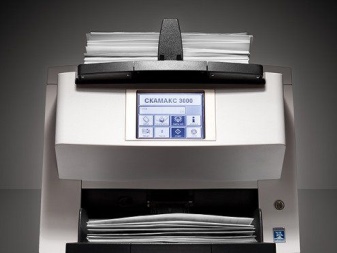
Scamax has a comfortable touch control panel. The main part of the settings is set through it. The panel is fully Russified. Important: the scanner is easy to upgrade and adapt to solve not quite typical tasks. The manufacturer positions its product as a good part of an integrated document management system and focuses on its reliability.
They will also delight the user:
advanced Ethernet Gigabit interface, blending in harmony with major operating systems;
submission of documents with automatic density measurement;
verified color rendering of graphics;
compliance with the latest energy conservation standards;
suitability for multi-shift work;
excellent wear resistance of all components;
development of both low and high optical resolutions;
the ability to digitize very small (from 2x6 cm) texts;
work with logging tapes;
absence of any risks when documents containing paper clips get into the working path;
convenient location of trays;
minimum noise during operation.
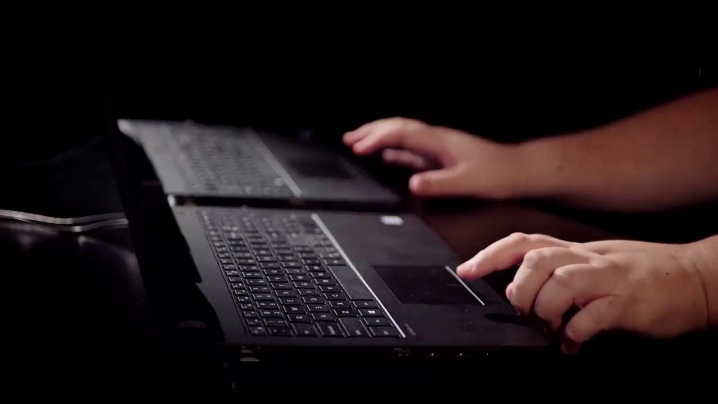
But you can also buy and Brother ADS-2200. This desktop scanner can process up to 35 pages in a minute. Just press one button to scan. The device is optimized for fast two-sided operation, compatible not only with Windows, but also with Macintosh. Saving files is possible in a variety of formats.
Available:
translation of text into e-mail;
transfer to the recognition program;
transfer to a regular file;
PDF creation with internal search option;
saving files to USB drives.
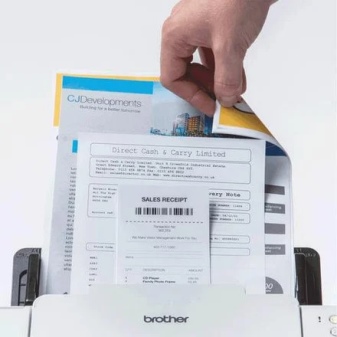
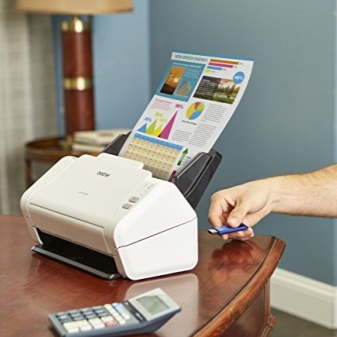
After scanning, all images will be automatically aligned.
The traces left by the hole punch will be removed from them. The output tray is easy to slide out and out. When inserted, the overall size of the device is A4. A CIS sensor is used for scanning.
Other parameters:
optical resolution 600x600 pixels;
USB connection;
interpolated resolution 1200x1200 pixels;
color with a depth of 48 or 24 bits;
automatic feeder for 50 pages;
weight 2.6 kg;
linear dimensions 0.178x0.299x0.206 m.
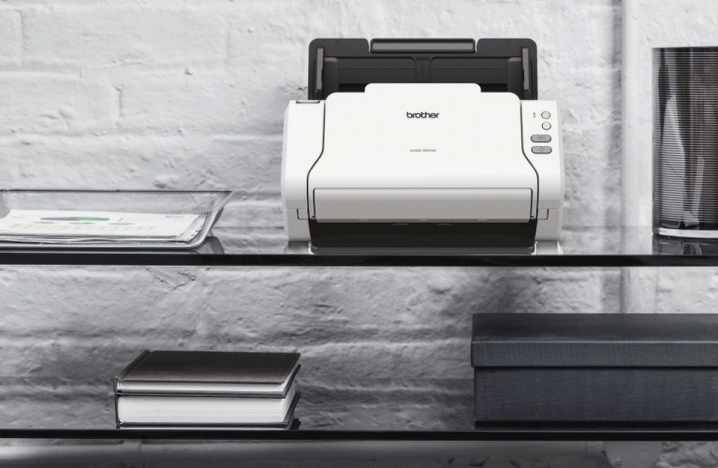
Another streaming model from a well-known manufacturer is HP Scanjet Pro 2000... The format of this scanner is A4. He is able to digitize 24 pages in a minute. The resolution is 600x600 pixels. User selectable color depth switches to 24 or 48 bits.
The package includes a USB data cable. The device is suitable for both general scanning of color images and for complex document work. The double-sided readout mode allows up to 48 images to be digitized per minute. The manufacturer has also managed to provide a pleasant modern design. The feeder is loaded with up to 50 sheets.
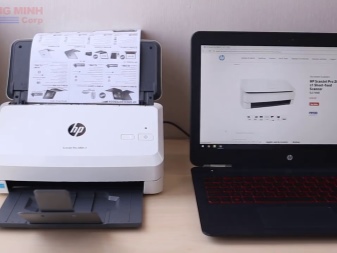
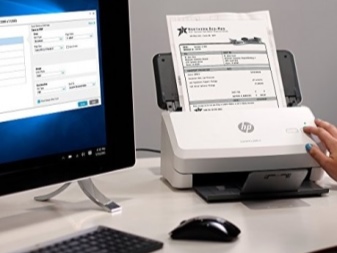
How to choose?
It would be possible to enumerate models of flow scanners for a long time, but it is equally important to analyze the main selection criteria. The most important of them, perhaps, is the number of sheets processed per day. For an ordinary company, 1000 pages per day may be enough. The average price range is occupied by models designed for 6-7 thousand pages per day. They are used in large companies as well as in libraries. There are scanners with even higher performance. But it is already needed by real professionals. Almost all devices are suitable for working with:
questionnaire forms;
advertising booklets;
plastic cards;
badges;
business cards and so on.
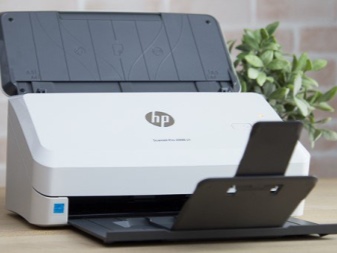

But we must take into account the minimum sheet size that can be scanned. In most versions of equipment, it is at least 1.5 mm. Thinner materials are problematic to handle. Most machines produced today are bi-directional, which improves overall productivity. However, the rare single-sided flow scanners are smaller and cheaper.
Having decided on these parameters, you can go to the choice a specific firm. Epson products have been considered the benchmark for quality for many years. And the company is steadily raising the bar to meet current requirements. Scanners from this manufacturer digitize images quickly and support many different formats.
Top-notch scanning accuracy is consistently noted in reviews.
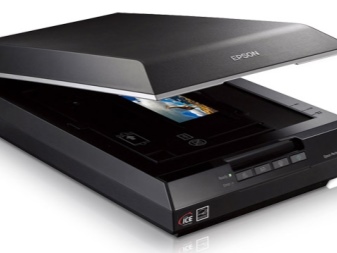
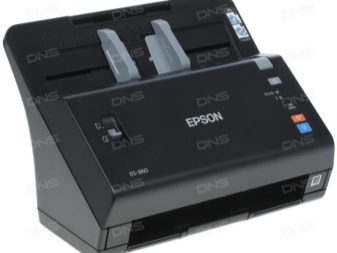
In assortment Epson there are both relatively inexpensive devices and productive devices. In terms of manufacturability and scanning accuracy, however, the technology successfully competes with them. Canon. It enhances the image and automatically corrects the text. But sometimes problems arise with the acceptance of the sheet. You should also pay attention to quite expensive, but technically flawless scanners. Fujitsu.
An overview of the Brother flow scanner is in the next video.













The comment was sent successfully.